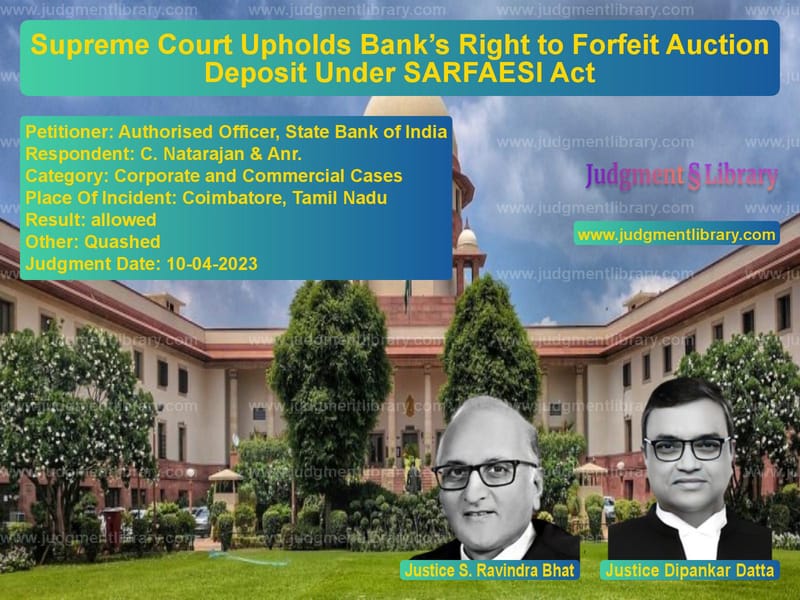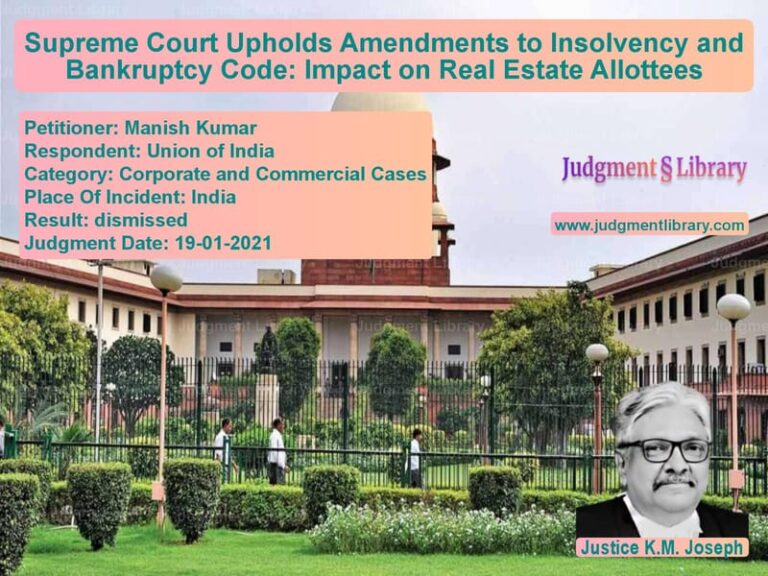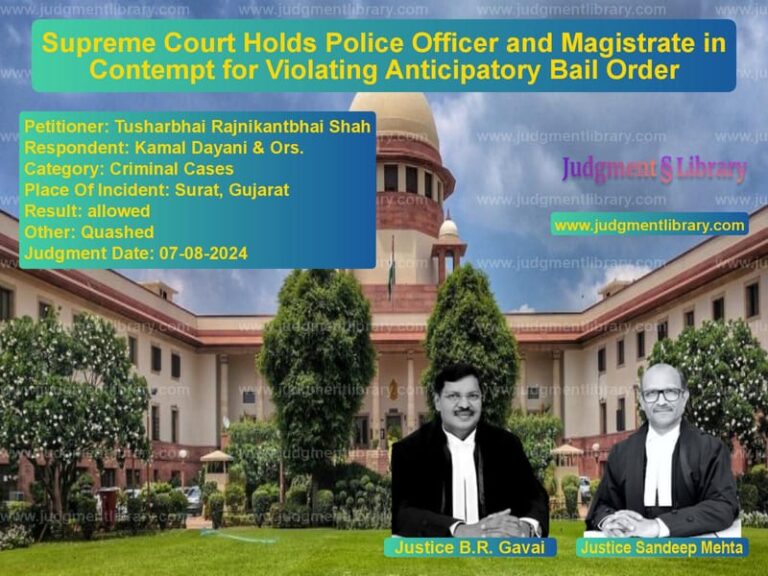Supreme Court Upholds Bank’s Right to Forfeit Auction Deposit Under SARFAESI Act
The Supreme Court of India recently issued a crucial judgment in the case of Authorised Officer, State Bank of India v. C. Natarajan & Anr., which addressed the legality of auction deposit forfeiture under the SARFAESI Act. The case involved a dispute between the State Bank of India (SBI) and an auction purchaser, C. Natarajan, who failed to make the full payment within the stipulated period. The ruling sets a precedent regarding the enforcement of auction terms and conditions and reinforces the principle that banks have a statutory right to forfeit deposits when a purchaser defaults.
Background of the Case
The dispute arose from the auction of a secured asset belonging to M/s Stallion Knitwear India Private Limited. The company had defaulted on its financial obligations, leading SBI to take possession of its secured assets under the Securitization and Reconstruction of Financial Assets and Enforcement of Security Interest (SARFAESI) Act, 2002.
Following the legal process, SBI issued an e-auction notice on August 22, 2017, for the sale of the secured asset, comprising plant and machinery. The highest bidder was C. Natarajan, who offered Rs. 1.23 crore for the asset. As per the auction rules, he was required to deposit 25% of the bid amount immediately and pay the remaining 75% within a stipulated time.
On September 15, 2017, Natarajan deposited Rs. 30.75 lakh (25% of the total bid amount). However, when the deadline approached for the remaining Rs. 92.25 lakh, he failed to arrange the funds and requested an extension. The bank granted an extension until October 23, 2017. Despite this, Natarajan was unable to complete the payment within the extended period.
As a result, SBI forfeited the deposit and canceled the sale. Natarajan challenged this action in the Madras High Court, which ruled in his favor, ordering the bank to refund the forfeited amount with 9% interest per annum. Dissatisfied with the ruling, SBI appealed to the Supreme Court.
Petitioner’s Arguments (State Bank of India)
- The auction terms clearly stated that failure to pay the remaining amount within the stipulated time would lead to forfeiture.
- Under Rule 9(5) of the Security Interest (Enforcement) Rules, 2002, forfeiture is a statutory consequence of non-payment.
- The bank had already extended the payment deadline, demonstrating reasonable accommodation.
- The High Court’s order interfered with a well-defined legal provision, setting a dangerous precedent where bidders could default without consequence.
Respondent’s Arguments (C. Natarajan)
- He had acted in good faith but was unable to complete the payment due to pending litigation before the Debt Recovery Tribunal (DRT).
- The bank later sold the asset for the same amount, implying no financial loss, making the forfeiture unjust.
- Forfeiture amounted to unjust enrichment, as the bank retained both the forfeited deposit and the subsequent sale proceeds.
Supreme Court’s Observations
- The court examined the legality of forfeiture under Rule 9 of the Security Interest (Enforcement) Rules, 2002.
- It noted that under Rule 9(5), auction purchasers are required to complete the full payment within 15 days, which can be extended up to 90 days at the discretion of the bank.
- Since the bank had already granted an extension, further leniency was neither required nor mandated.
- The court held that forfeiture was a legal and contractual consequence of non-payment and should not be interfered with.
Key Judicial Precedents Cited
- Bhagat Ram v. State of Himachal Pradesh (1983) 2 SCC 442 – The court reiterated that penalties must align with the severity of misconduct.
- Agarwal Tracom Pvt. Ltd. v. Punjab National Bank (2018) 1 SCC 626 – Confirmed that forfeiture of an auction deposit is a valid enforcement measure under the SARFAESI Act.
- Jitendra Kumar Srivastava v. State of Jharkhand (2013) 12 SCC 210 – Ruled that financial penalties must be supported by statutory authority.
Final Judgment
The Supreme Court ruled in favor of SBI, setting aside the High Court’s decision. The key rulings were:
- The forfeiture of Rs. 30.75 lakh was legally valid and enforceable.
- Courts should not interfere in forfeiture cases unless arbitrariness or procedural violations are demonstrated.
- Auction purchasers must comply with payment deadlines, as failure to do so invites forfeiture.
Implications of the Judgment
The ruling reinforces the integrity of auction sales under the SARFAESI Act and ensures financial discipline in the banking sector:
- Strict Enforcement of Auction Rules: Bidders must ensure timely payments, as banks will enforce forfeiture clauses strictly.
- Limited Judicial Intervention: Courts will not override forfeiture provisions unless the bank’s actions are arbitrary or procedurally flawed.
- Banking Sector Clarity: The decision affirms that financial institutions have the right to forfeit deposits if auction terms are violated, ensuring smooth debt recovery processes.
Conclusion
This judgment establishes a critical precedent for auction sales conducted under the SARFAESI Act. It underscores the importance of financial discipline among auction purchasers and ensures that banks can enforce their rights without unnecessary judicial interference. The ruling provides much-needed clarity on forfeiture provisions, reinforcing that bidders must adhere to the payment timelines to avoid legal consequences.
Read also: https://judgmentlibrary.com/supreme-court-quashes-re-investigation-order-in-insurance-bribery-case/
Petitioner Name: Authorised Officer, State Bank of India.Respondent Name: C. Natarajan & Anr..Judgment By: Justice S. Ravindra Bhat, Justice Dipankar Datta.Place Of Incident: Coimbatore, Tamil Nadu.Judgment Date: 10-04-2023.
Don’t miss out on the full details! Download the complete judgment in PDF format below and gain valuable insights instantly!
Download Judgment: authorised-officer,-vs-c.-natarajan-&-anr.-supreme-court-of-india-judgment-dated-10-04-2023.pdf
Directly Download Judgment: Directly download this Judgment
See all petitions in Bankruptcy and Insolvency
See all petitions in Corporate Compliance
See all petitions in unfair trade practices
See all petitions in Judgment by S Ravindra Bhat
See all petitions in Judgment by Dipankar Datta
See all petitions in allowed
See all petitions in Quashed
See all petitions in supreme court of India judgments April 2023
See all petitions in 2023 judgments
See all posts in Corporate and Commercial Cases Category
See all allowed petitions in Corporate and Commercial Cases Category
See all Dismissed petitions in Corporate and Commercial Cases Category
See all partially allowed petitions in Corporate and Commercial Cases Category







